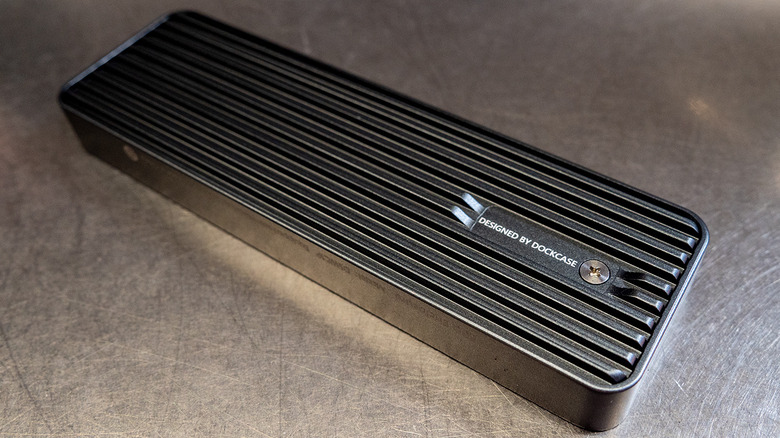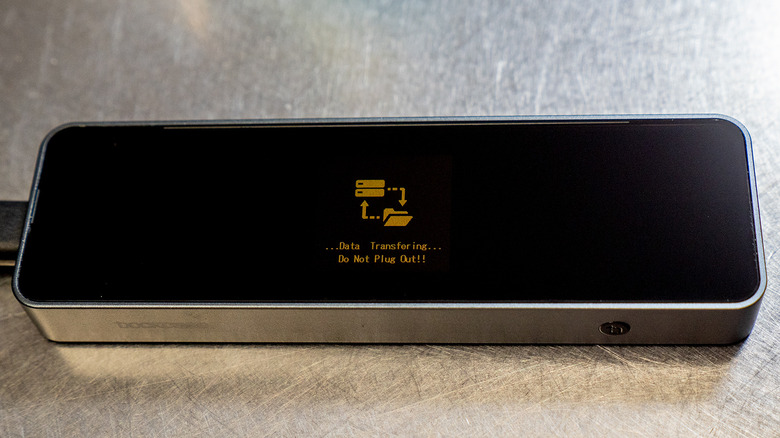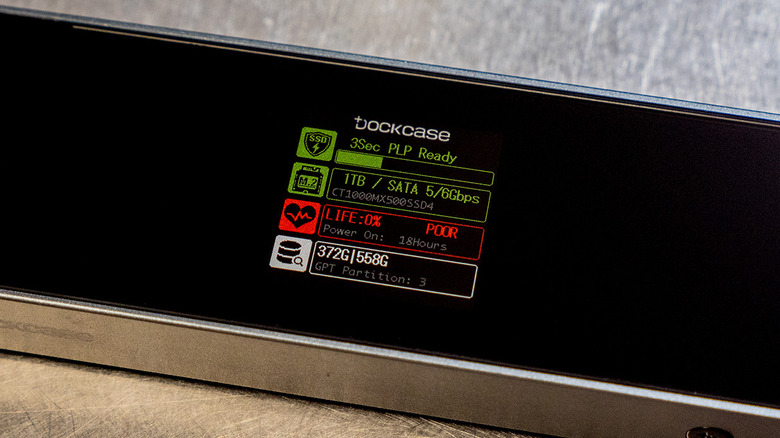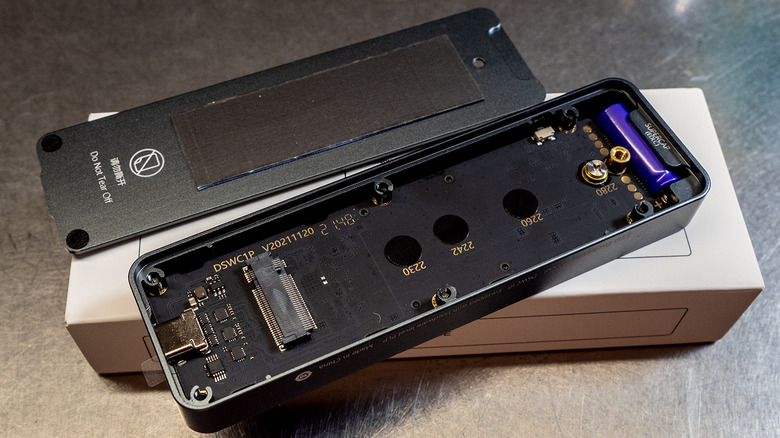DOCKCASE SSD Enclosure Review: A Smart Way To Protect Your Data
Data has become a very important part of our modern lives, from the files we produce at work to the entertainment we consume at home. Data storage solutions have been on the uptick in the past years for this reason, and Network-Attached Storage (NAS) products have become a part of some people's homes.
Sometimes, however, you need large and super-fast storage that you can carry everywhere with confidence, something that plain USB sticks and external HDDs are unable to provide. Solid-state drives (SSDs) are often the preferred solution for this need, but portable SSDs are still too expensive for most people. Enclosures provide that middle ground but don't offer the safety and stability often found with dedicated external drives. That's where DOCKCASE comes in with its Smart SSD Enclosure. We got our hands on a unit and put it to the test, assessing its promised speed, intelligence, and, more importantly, reliability.
The Smart SSD Enclosure
At 5 x 1.5 x 0.55-inches, the DOCKCASE Smart SSD Enclosure sits somewhere between a large USB thumb drive and an extra small external hard disk. Although it's larger than USB sticks, the storage solution is still small enough to easily slip into your pocket when you're in a rush. It won't take up too much space on an already cluttered desk, and you can easily position it anywhere you want thanks to the use of a USB-C cable.
The enclosure's body is made from strong aluminum alloy with a tempered glass surface on top, giving it durability, as well as a smooth, premium look. The bottom cover, however, has fins that prevent it from sliding in your hand or from a flat surface. We did notice the glass top is a dust and fingerprint magnet, so you might find yourself wiping it often to properly see the screen readout.
That screen immediately sets the DOCKCASE Smart SSD Enclosure apart from normal alternatives. Bright and colorful, the display makes it easy to see information at a glance, ranging from the health of the SSD inside to partition information. A dedicated D-Key allows you to cycle through different pages of information quickly without having to go through menus.
If there is one thing we wished was implemented better in the design, it's the removable USB-C cable. The cord means that you'll need to carry one additional accessory and hope it doesn't go missing when you need it. You could simply keep it connected to the enclosure all the time, but it sticks out from the body, increasing the space you need to store it.
A single screw holds down the finned bottom cover, and another screw keeps the SSD in place inside. While this does mean that an accident won't dislodge the drive, it also means you'll have to carry along a small screwdriver if you want to change SSDs at a moment's notice. A tool-less design option would have been nice but is probably unnecessary for most users.
Performance
The DOCKCASE Smart SSD Enclosure uses USB 3.2 Gen 2 Type-C for its connection, promising high-speed data transfer rates. It's not as fast as Thunderbolt, but it offers more compatibility with computers and devices. It works perfectly for most purposes, and you won't be trying to run a monitor off it or draw power from it anyway.
DOCKCASE advertises a transfer speed of 1GB in one second, and that does check out in our test, more or less. We were able to transfer a 3GB file in a little less than four seconds, which is a good rate for real-world situations. That said, speed isn't exactly the enclosure's best feature since almost any SSD can deliver that same throughput.
What really sets this smart enclosure apart is its built-in Power Loss Protection, which ensures your data won't get corrupted when the SSD is accidentally disconnected from its power source, often a computer. This feature is made possible by internal super-capacitors that provide emergency power for around 10 seconds, just enough time to completely write any pending data before it shuts down. This guarantees no data will be lost or corrupted in case of a power failure, which also helps prolong the SSD's life in the long run.
The enclosure is compatible with four SSD sizes, both M.2 NVMe and SATA types. The enclosure has clear indicators for 22x80, 22x60, 22x42, and 22x30 SSDs inside, so you'll know where to place that screw. Given this flexibility, it's understandable that DOCKCASE opted to use screws rather than clips that might not offer the same stability.
Firmware and features upgradability
Going beyond what regular SSD enclosures offer, DOCKCASE also gives its latest product some brains. The enclosure packs software that analyzes your SSD's health and informs you when your data is in danger of being lost due to a failing drive. This gives you enough time to backup or transfer your precious files to another SSD before the worst-case scenario happens.
These details are immediately available on the enclosure itself without the need for a separate app running on a computer. With just a small bit of power, you can already get that information and won't even have to connect it to a device, making it easy to run a diagnostic any time.
DOCKCASE uses the standard SMART monitoring system to measure the drive's health, and we did run into a bit of a hiccup in that area. We were puzzled over why our M.2 SSD was graded as having a "Poor" life when it was working fine. Apparently, this was how DOCKCASE indicates that it actually failed to get accurate information from the SMART analysis because the SSD was incorrectly recognized.
According to DOCKCASE, this happens when the SSD is relatively old, and its manufacturer uses its own SMART implementation rather than the standard. While that's understandable, labeling the SSD life as "Poor" is very confusing and might even cause some panic. The manufacturer clarified that our review unit is still in beta, so the final version that ships out might show a clearer message.
The great thing about this enclosure is that problems like this can be easily fixed with a firmware upgrade. Unless the issue is in the hardware itself, there is no need to get it repaired or replaced. Performance and features can even be improved through such updates, though that also leaves the risk of broken firmware rendering the device unusable.
Final take
With plenty of "smart" data storage solutions out there, life can sometimes be more complicated than necessary, especially when those solutions inundate you with features that try to be too smart. The best products are the ones that don't make you think about those features while delivering safety and confidence like this DOCKCASE Smart SSD Enclosure. With built-in PLP for data integrity and a screen that immediately shows your SSD's health, you don't have to take extra steps to make sure your files are safe.
Yes, we do have a few nitpicks, but those look minor compared to the grand picture. We wished the USB-C cable was built-in and could be hidden inside the body, but that may have made the enclosure bigger than necessary.
Our brief misadventure with the SSD life status can also be easily fixed with a firmware upgrade later. All in all, the DOCKCASE Smart SSD Enclosure seems like the perfect answer to the need for high-speed, portable, and safe data storage. It is currently on Kickstarter for $69 or $79, depending on which model or tier you aim for, and it will ship by April this year.




